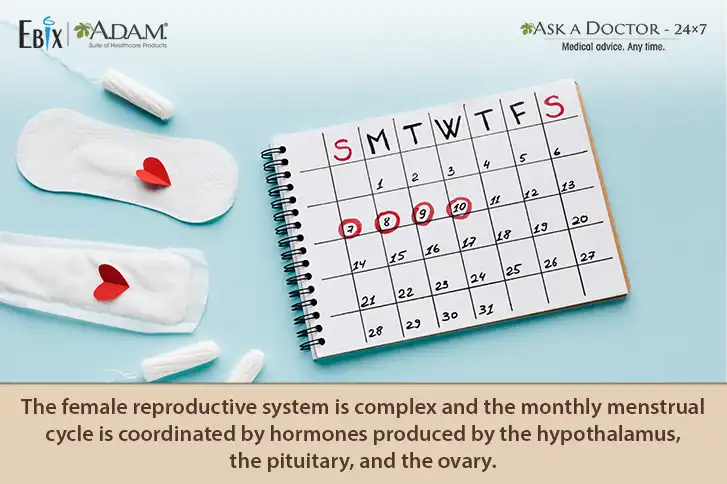Irregular Periods? It Can Be A Sign Of Thyroid Dysfunction
Getting regular periods is a healthy trait for every woman. If you notice your periods getting irregular for the last many months, and you are unsure of any reason; maybe, your thyroid is the culprit. Yes! You read it right. Since thyroid hormones regulate the metabolism and development of ovarian, uterine, and placental tissues, thyroid dysfunction can lead to menstrual asymmetry or infertility in women.
Read the article in detail to know about the connection between the thyroid and your irregular periods.
How Would You Decide On Periods Being Irregular?

The menstrual cycle recurs every 28 days and lasts for 4 to 7 days for most women. Varying slightly from normal duration in each cycle is also normal but if you miss it frequently, get it before 21 days or after 35 days for more than 3 months in a row, notice spotting between periods, or experience heavier or lighter menstrual flow very often then you must consult a gynecologist immediately as it can be an indication of other underlying disorders including thyroid.
Potential Factors Leading To Irregular Periods
Women can miss their periods:
- During the first year or two, for women in their early puberty
- During menopause generally at ages 45 to 55
- Due to the Intake of contraceptive pills or medications containing steroids
- During early pregnancy
- In Medical conditions like PCOS, Thyroid disorders, or other hormonal disorders
- Due to mental stress periods may also get irregular
- Due to surgery or any other clinical procedure leading to excessive blood loss
- Due to some Illnesses like viral or other infections
- Due to miscarriages or pregnancy-related issues
Besides the above-mentioned reasons, one may miss periods because of an inappropriate lifestyle, excessive exercise, or significant body weight variation.
`
Role Of Thyroid In Regulating The Menstrual Cycle
Women have more tendency to develop thyroid disorders than men, incidences are more likely to happen during puberty, menopause, and pregnancy. The thyroid, a small butterfly-shaped gland in the neck produces hormones that regulate many essential body functions like metabolism, body temperature, heart rate, growth, digestive, and also reproductive behavior. The levels of thyroid hormones in the body are controlled by signals from the brain. The hypothalamus, an important part of the brain secretes thyroid-releasing hormone (TRH) and stimulates the pituitary, a small-sized endocrine gland in the brain to secrete thyroid-stimulating hormone (TSH). TSH then stimulates the thyroid gland to release thyroxine (T4) and triiodothyronine (T3). TRH from the hypothalamus, TSH from the anterior pituitary gland, and T3 and T4 from the thyroid work in a feedback loop to influence almost every organ of the body. When the thyroid hormone level in the body gets low hypothalamus and pituitary produce more TRH and TSH to increase their level and if it gets high they produce less TRH and TSH to bring down their level to normal.
The monthly menstrual cycle is harmonized by Luteinizing hormone (LH) and Follicle-stimulating hormone (FSH) and sex steroid hormones; estrogens and progesterone. Their production is in sync with the hypothalamic-pituitary-thyroid axis known to control the thyroid hormone level in the body. T3 and T4, two main hormones secreted by the thyroid affect the release of sex hormones and thus regulate the menstrual cycle.
Thyroid Disorders Affecting The Menstrual Cycle
- Hyperthyroidism (over-secretion of thyroid hormones) or hypothyroidism (under-secretion of thyroid hormones), both influence the occurrence of the menstrual cycle, making periods heavy, light, irregular, or even absent.
- Hyperthyroidism is associated with a wide spectrum of reproductive disorders ranging from delaying the onset of menses (at puberty) to oligomenorrhea (infrequent periods) and amenorrhea (absent periods) during the reproductive age. Besides a light and short menstrual cycle, decreased fertility, and increased risk of miscarriages could result due to hyperthyroidism during pregnancy. Other noticeable symptoms of an overactive thyroid gland are muscle weakness, rapid or irregular heartbeat, heat intolerance, significant weight loss, tremors, etc.
- Hypothyroidism could result in heavy or frequent, infrequent or absent, menstrual bleeding. Infertility and miscarriages could also be experienced in grown-up women. Other symptoms of an underactive thyroid gland are constipation, fatigue, dry skin, slow heartbeat, cold intolerance, significant weight gain, etc.
Diagnosis For Thyroid Disorders
If your gynecologist doubts, thyroid disorders are the cause for your irregular periods, you will be suggested to take blood tests as they are one of the most definitive ways to diagnose thyroid hormone imbalance in the blood. This includes primarily the investigation of TSH levels to figure out if you have an early-stage thyroid disorder, but T4 and T3 and thyroid antibody tests can also be done to confirm any discrepancies. An elevated TSH level most often is an indication of hypothyroidism and a low TSH level of an overactive thyroid. Your healthcare provider may also follow some additional investigations like imaging tests to rule out any severe condition.
Treatment For Thyroid Disorders To Alleviate Menstrual Issues

Depending on your thyroid condition and considering other parameters like age, diet, body weight, lifestyle, and pregnancy stage ( if you are pregnant), etc. your healthcare provider may prescribe a treatment that generally includes anti-thyroid drugs to treat hyperthyroidism and synthetic-thyroid hormone replacement drugs, to treat hypothyroidism. By following the proper medication you can manage your thyroid disorders well to get your menstrual irregularities or fertility problems treated in the right stage. In the worst cases only, surgery is needed to cure thyroid diseases.
Thyroid health affects both men and women differently. Women experience menstrual cycle-related concerns however symptoms could range from mild to severe depending on the severity of the thyroid disorder. Usually, these problems are not serious and could be normalized with timeous medical intervention but be sure to speak to a gynecologist as soon as you notice any significant change in your menstrual cycle, to avoid complications at later stages. Uncontrolled hyperthyroidism and hypothyroidism could be risky, especially if you are, or are planning to become pregnant soon as it may end up causing problems for both, the expecting mother and baby.
If you are experiencing any menstrual cycle-related issues drop your queries at https://www.healthcaremagic.com/ to get 24/7 expert advice.
For personalized medical advice on thyroid-related issues Consult a Thyroid Specialist online.
Recently Answered Questions Related to Thyroid and Menstrual Cycle
Ask a Specialist
Recent Questions


